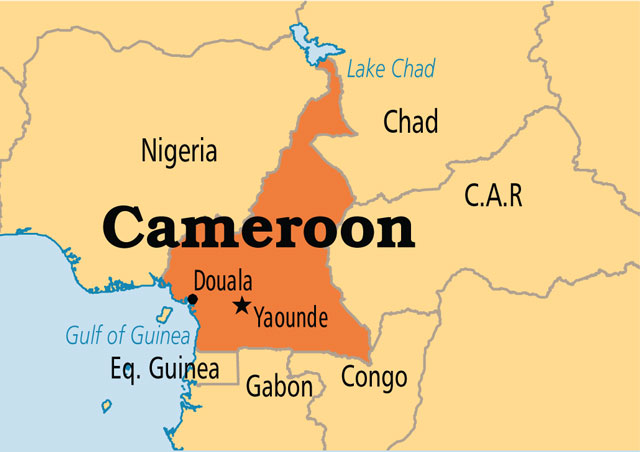
Yaoundé, Cameroon | AFP | Gunmen kidnapped 79 school students on Monday in an English-speaking region of Cameroon where separatists are fighting an armed campaign for independence, security and government sources said.
The abductions, the worst incident so far in 13 months of unrest, came just a day before longtime President Paul Biya was to be sworn in for a seventh term in office.
“Seventy-nine pupils and three supervisors” were seized, Communications Minister Issa Tchiroma Bakary, who is also government spokesman, told AFP.
A government official said the three comprised the school’s principal, a teacher and a driver.
A source close to the school said the abducted students “are mainly boys.”
A six-minute video seen by AFP, but which could not be immediately confirmed independently, showed 11 boys apparently aged about 15 giving their identity and name of the school in English, and adding that they were abducted by the “Amba Boys” — the name for anglophone separatists.
The first mass abduction in Cameroon follows two major such incidents in neighbouring Nigeria, where the Islamist group Boko Haram snatched more than 200 schoolgirls from the Borno state town of Chibok in April 2014.
Some 107 girls have since been released or found, but the Islamist group abducted scores more schoolgirls from neighbouring Yobe state in February this year.
The students kidnapped Monday were enrolled at the Presbyterian Secondary School in Bamenda, capital of Cameroon’s Northwest Region — one of two regions hit by attacks by anglophone militants that have met with a brutal crackdown by the authorities.
“The search for the hostages has been launched — every man has been called in,” the government source said, speaking after a crisis meeting.
Elsewhere in the region, a high-ranking local official was also seized, a security official told AFP.
The school’s website says that the student body numbers more than 700, drawn from “all the religious and linguistic origins of Cameroon.”
– Tension –
The kidnappings coincide with an upsurge of political tensions in the majority French-speaking country.
It comes after elections on October 7 in which 85-year-old Biya, who has ruled the country with an iron fist for 35 years, was credited with 71.3 percent of the vote.
The polls however were marred by allegations of widespread fraud, low voter turnout and violence.
Around a fifth of Cameroon’s 22 million people are English-speaking — a minority whose presence dates back to the colonial period.
Cameroon, once a German colony, was divided between Britain and France after World War I.
The French colony gained independence in 1960, becoming Cameroon. The following year, the British-ruled Southern Cameroons was amalgamated into it, giving rise to the Northwest and Southwest regions.
But resentment at perceived discrimination at the hands of the francophone majority, especially in education and the judiciary, began to build.
In 2016, demands for greater autonomy grew but have been rebuffed by Biya.
– ‘Republic of Ambazonia’ –
As radicals took the ascendancy, the anglophone movement declared the creation of the “Republic of Ambazonia” in the Northwest and neighbouring Southwest Region on October 1, 2017.
No country has recognised the self-declared state.
The separatists have gunned down troops and police, boycotted and torched schools and attacked other perceived symbols of the Cameroonian state.
They have decreed a boycott of schools, saying that the French-speaking education system marginalises anglophone students.
At the start of the school year in September, several secondary schools were attacked, a headmaster was killed and a teacher was badly mutilated.
The authorities have responded with a massive crackdown by police and troops.
At least 400 civilians have been killed this year as well as more than 175 members of the security forces, according to a toll compiled by non-governmental organisations.
The conflict has seen a resurgence in the Northwest region after several months of calm while fighting was worse in the Southwest region.
More than 300,000 people have fled the violence, many of them living hand-to-mouth in the forests, and some across the border into Nigeria.
In the October 7 election, turnout was a meagre five percent in the Northwest and 15 percent in the Southwest — but Biya won more than two-thirds of the vote in both regions.
 The Independent Uganda: You get the Truth we Pay the Price
The Independent Uganda: You get the Truth we Pay the Price





